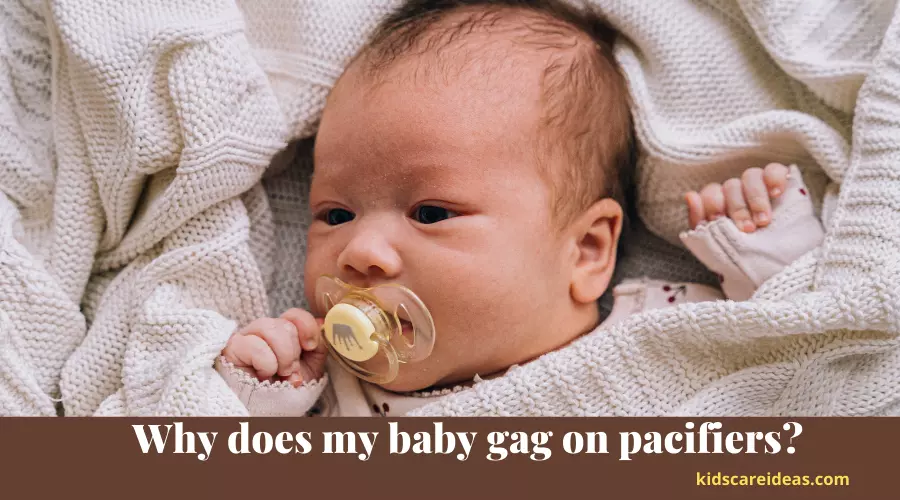Pacifiers are a typical child’s toy that many children have.
It helps calm a baby and is also a great way to help babies sleep. Babies use pacifiers to help soothe themselves.
But for some babies, pacifiers can cause quite a bit of discomfort. This is because of the shape and size of the pacifier.
Certain babies tend to gag when they suck on pacifiers. This gagging can be very worrying to parents.
Many parents ask, why does my baby gag on pacifiers?
There are different reasons why this happens.
Here we will look at the various reasons your baby may gag and what you can do about it.

Let’s get started!
Why does my baby gag on pacifiers?
The gag reflex applies when a baby has a pacifier in the mouth. The brain causes the baby to gag because it protects the baby from swallowing the object the baby does not intend to swallow. The baby will instinctively gag without even realizing it.
The gag reflex is a natural defense mechanism for the mouth that prevents items from entering the airway.
Babies have their gag reflexes fully functioning, which is crucial to avoid anything that might pose a choking hazard.
Parents must know the symptoms of this reflex, characterized mainly by a pulling back of the tongue and making a face of disgust.
The gag reflex helps babies keep themselves safe by gagging anything that doesn’t taste good or feels uncomfortable in the mouth.
Why does a pacifier make a baby gag?
The pacifier is designed to resemble a thumb, and it is smaller in size than a thumb, which causes it to reach the third posterior part of the tongue more easily and triggers the gag reflex.
The baby finds this unpleasant feeling unpleasant and wants to avoid it.
The baby also has no intention of swallowing the pacifier because it is already associated with the gag reflex.
This is why babies gag when they suck on a pacifier.
The gag reflex acts as an evolutionary defense mechanism to alert the person of danger.
Typically, food doesn’t cause an unpleasant sensation; therefore, when the mouth comes in contact with an object that is not food, the gag reflex is activated to prevent the person from swallowing the thing.
Is it normal for babies to gag on pacifiers?
It is entirely normal for any baby to gag on pacifiers. Parents worldwide see babies gagging on pacifiers, although it can be pretty shocking. It’s normal for the baby to gag on pacifiers just like the baby can gag on any other object placed in their mouth. Gagging is normal, and it should not scare any parent.
Why do babies reject pacifiers?
One of the reasons a baby rejects the pacifier is hunger.
The baby may suck the pacifier and realize it’s not solving the hunger problem forcing the baby to reject the pacifier.
Another reason why the baby rejects the pacifier is that the baby is tired.
The baby may have depleted the sucking strength and can no longer hold the pacifier using the mouth.
Another cause of the baby rejecting the pacifier is because the pacifier is too large for the baby’s mouth.
The design of the pacifier may force the baby to reject the pacifier.
The baby may have difficulty holding the large pacifier using a tiny mouth.
What does it mean when an infant gags?
An infant gagging means the baby is coughing and expelling an item from the mouth using the mouth. Gaggling noises usually accompany it, and the baby avoids being choked by the thing in the mouth.
It is common for babies to gag. Gagging is a protective mechanism to clear the throat of food or objects that could cause choking.
When an infant gags, you can try to comfort the baby or hold its hands or feet to keep it from trying to gag again.
Should you force a baby to take a pacifier?
Babies are very particular about what they like and don’t like. They know what they need and when they need it.
You should never force a pacifier on your baby if the baby spits the pacifier or refuses you to put it in the mouth.
You should leave it that way. The baby may be hungry, or the pacifier may not fit in the mouth, forcing the baby to refuse it.
The baby may cry a lot if you force the pacifier on them.
How do I stop my baby’s gag reflex?
The best way to stop the gag reflex is by allowing the baby to improve the gag reflex. The baby will manage to control the gags with time, especially if they allow your baby to have small, soft chunks of food. The baby will develop the gag reflex by swallowing the chunks of food independently.
It’s essential to know the difference between normal gagging and serious. If it’s frequent and the baby is gagging on everything, it might be a sign that there are underlying issues and the baby needs to see a doctor.
Conclusion
Let’s conclude the post on why does your baby gag on pacifiers!
Here are some good Pacifiers which are excellent available on Amazon:
When it comes to learning the art of pacifier use, it’s important to remember that each child is different.
Every baby has different habits and preferences, and some babies take to the pacifier right away, while others don’t.
Gagging on a pacifier is a common occurrence in babies. Babies often gag on pacifiers while they are teething.
Their gums become sore and more sensitive to touch when they have a tooth coming in, making it more uncomfortable for them to use a pacifier.
In many cases, babies will learn to adjust to the discomfort and carry on using their pacifiers.
I hope you enjoyed reading the post.




